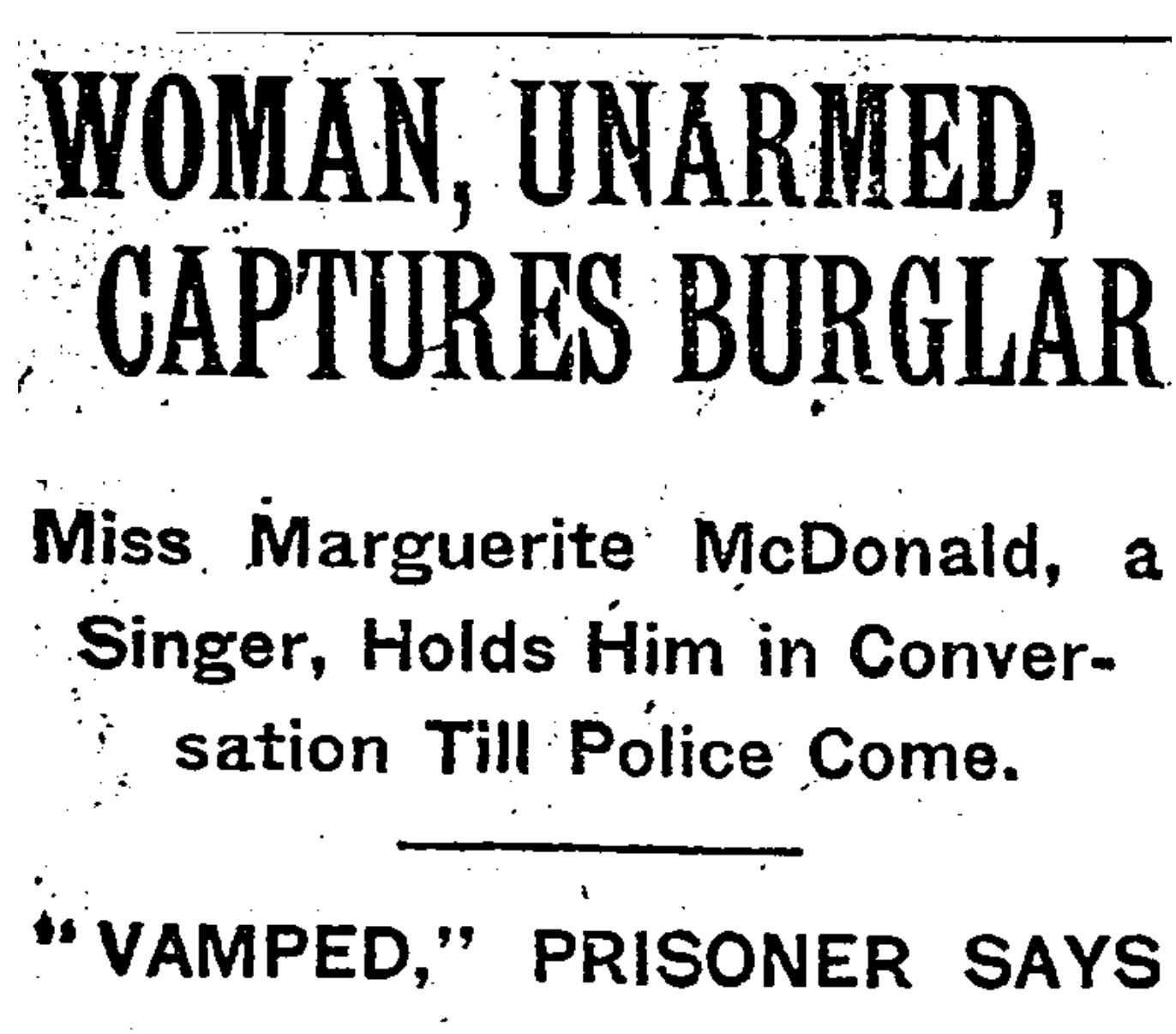Important Stuff!
Before we get into this week’s issue, remember that Strange Times is moving to my Patreon. To keep receiving the newsletter, follow this link and click join for free.
Click here to see how today’s post looks on Patreon. Issue 203 will be the last one I’m cross-posting, so make the switch today!
Today we have three stories of women taking the law into their own hands. Shoot a cat 27,000 times on…
July 21, 1921
Drunk on what he calls “good whisky,” Samuel B. Hatchel, “a muscularly built young man” is arrested after punching several people in Times Square.
North Carolina woman Mellissa J. Woodington sues a local grocer for $10,000, claiming damages because he sold her husband “flavoring extracts” whose high alcohol content caused him to beat her.
Bill Burns, star witness for the prosecution of the baseball players accused of throwing the 1919 World Series, tells the courtroom about how the players “double-crossed” their underworld backers by winning Game 3 after their backers refused to pay them for their nefarious work.
Sergeant Alvin York, made famous during World War I for single-handedly capturing 128 German soldiers, struggles to keep his Tennessee farm afloat after refusing every offer to capitalize on his fame.
A French priest is arrested while stealing toys for the poor children of his village church.
The Weather: Fair today and Friday; moderate temperature; moderate and northwest winds.
Vamped! The Times loves a story of an unarmed woman thwarting a burglar and this one is of particular quality. Come for the feminine moxie and stay for the shocking turn that it takes in the third to last graf!
In fiction the heroine picks up a buttonhook and cows the burglar, who labors under a conviction that revolver is aimed at him. Early yesterday morning Miss Marguerite McDonald, a singer, saw a burglar ransacking her apartment and held him in conversation for twenty minutes until the police came. But she did not use even a buttonhook. The intruder was a Finn, 18 years old, who apparently was too frightened to try to escape, although he stood almost beside the window by which he had entered.
The dialogue between the singer and the intruder ran true to fiction. The young man told what the police called the “out-of-work, hungry-and-won’t-you-give-me-another-chance” story. Neither the singer nor her mother, who occupy an apartment on the first floor of 316 West Eight-eighth Street, just off West End Avenue, was dissuaded from calling the police, so the story of Miss McDonald’s adventure was told in the West Side Court. The prisoner, accused of burglary, said that he was John Bjorkman and that he had been sleeping along the waterfront.
“I was half awake, when, about 4 o’clock, the sound of a drawer in the front room being stealthily opened awoke me,” Miss McDonald said. “I could descry the figure of a man stooped in front of the bureau.
“What are you doing there?’ I called. The man raised his head.
“Mother, get the revolver,’ I called to my mother, who was in the next room. We have no revolver and never had any, but I heard mother get up and I knew she would call out the window to the woman who owns the house to get the police. That was just what she did.”
The young woman said she was not frightened. She slipped into a kimono. Her surprise was great when, instead of bolting through the window, the intruder put his hands above his head and waited for her.
Miss McDonald summed up all her feelings thus, after it was all over: “He did not shoot and he did not run away, so one of us had to take a chance. Anyway, I was as big as he was.”
“Have you a revolver?” she shot at the man.
“No, lady,” and the voice that answered had a tremor in it. “I haven’t taken anything.”
Miss McDonald “frisked” her prisoner, but none of the jewelry, valued at $1,000, the drawer contained had found its way into his pockets. When Mrs. Marguerite McDonald, her mother, came into the room she suggested that perhaps Bjorkman had taken some of their private papers.
“I haven’t got a thing,” repeated the young man, and took off his coat and handed it to the older woman to search. He pleaded that the police be not called. Miss McDonald took a seat and so did her mother.
“How long have you been doing this sort of thing?” she asked.
“I never did this before,” replied the prisoner. “I was desperate. You see I was out of work and hungry. I have been sleeping on the waterfront.”
What would have been a quiet arrest was made a neighborhood sensation when a policeman smashed the unresisting prisoner twice in the face and, as Miss McDonald said, knocked him out. After that windows went up along the block.
The only explanation the prisoner gave for failing to take advantage of the open window way to escape was: “I must have been vamped by the girl.”
Magistrate Raphael Tobias held Bjorkman in $5,000 bail for trial. The prisoner had pleaded guilty to a charge of burglary.
I’d like to hear from the children on this one, but their testimony is unrecorded. I’ve said before that this entire newsletter could be understood as an argument for no fault divorce and this is another one to throw on that pile.
SYRACUSE, N.Y., July 20.—Charges that his wife, Minerva M. Langley, and three of their five children had plotted to kill him by hanging are made in an answer to his wife’s suit for separation, filed here today by Frank S. Langley, former deacon and member of the board of the Christian and Missionary Alliance Church in this city.
Langley charges that the “props were set and the noose prepared” in the effort to make away with him, and that the attempt was the culmination of a quarter century of turbulent, tempestuous matrimonial existence.”
During that time, he admits, he has been taken before the courts eight times to answer to charges of alleged failure to provide properly for his family.
The former deacon and church official charged that the plot to hang him was perfected and almost carried out Feb. 5 of this year. He declared that his wife and three children had ropes, clubs and knives ready; that a noose was about to be slipped about his neck, when, with the aid of neighbors, he broke loose from the alleged conspirators and ran across lots to the home of his brother.
He further asserted that his wife and children “Set upon him and attempted to overpower him,” so that the wife could slip the noose around his neck.
He said that during their married life she threw all sorts of missiles at him, scratched and choked him, fed him dry bread for breakfast, throttled him when he broke the seals of his pay envelope and otherwise treated him with extreme cruelty.
In her suit for separation Mrs. Langley charges that he left her destitute for eight years, his actions caused her to call for his arrest eight times, he beat her severely, held a butcher knife over her head, threatened her, hurled her down a flight of stairs, and choked her son and struck her when she interceded.
The denouement of the case will come at the special Fall Term of the Supreme Court.
In which West Orange decides it was probably a bad idea to let its residents stalk through the streets firing guns at cats.
WEST ORANGE, N.J., July 20.—The proposed West Orange cat ordinance, providing for the killing of stray cats, died a painless death at the meeting of the Town Council last night. A number of women appeared before the council and objected so strenuously that the ordinance was defeated.
The ordinance, which was drawn up by School Trustee Stanley Babson, would have given permission to any one to kill any cat at sight, when it was off its own premises. Among the leaders of the protesting women were the Misses Mary and Gertrude Knevels, sisters, of Wheeler Street. The latter declared that the proposed ordinance would be contrary to the fish and game laws, under which no one may fire a gun without a license.
Another objection pointed out by Miss Knevels was that not all men can shoot straight, and “bullets would be as thick as flies” in West Orange. Moreover, she said, the cats would be only wounded, and would crawl off to suffer and die, and then the town would have the Society for the Prevention of Cruelty to Animals after it.
Two men also joined the objectors. John Gianni said that he lived near the town dump, and his house would be infested with rats if the cats were killed. Michael Blessington said that it would take nine hits to kill each cat, as each cat had nine lives. Military experts have found that there are 3,000 misses for every hit, he said, so that 27,000 shots would be necessary to kill each cat. Thus West Orange would be turned into a “lead mine.” The ordinance had no defenders.









